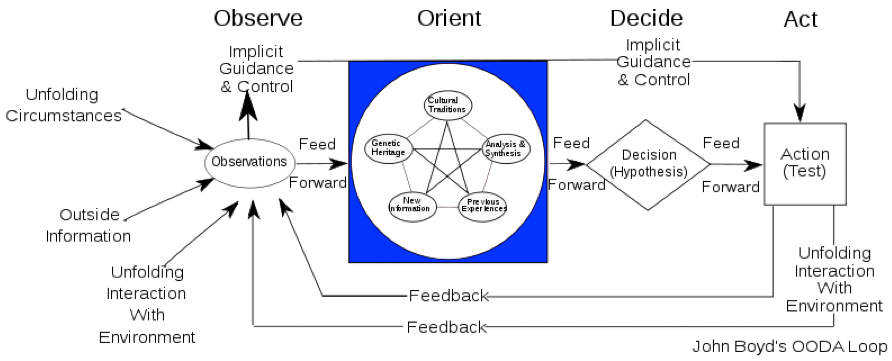Regulation seems to be everywhere. When you walk into a supermarket to buy a loaf of bread a web of regulations has been invisibly at work, regulating what can be sold and to whom, food safety, store size how commodities are packaged and way that supermarket employees can be treated. Laws shape our environments, our behaviors and ultimately our lives. But when we think about law we tend to think about the formal constitutional structure that makes and changes laws and gives them legitimacy; democratically elected parliaments, the separation of powers between the legislature, judiciary and executive branches, basic human rights and the independence of the courts. Each of these is important. But when we view law only as a system to allocate and constrain power we also miss some things.
If we use a different lens and look at the legal system as an information processing system the results are surprising. One of the suprises the absence of feedback loops. What few feedback loops can be found in legal systems are crude, sluggish, and under-inclusive. Not matter how carefully a law is drafted once it is passed there is no feedback loop evaluating how it is affecting people's lives. To anyone familiar with biological, computer or business systems this is astonishing. Feedback loops are essential to just in time manufacturing, dynamic logistics and spiral branding. O'Reilly Media recently dubbed the contemporary economy 'the feedback economy' stating that companies that employ data feedback loops are poised to dominate their industries. Perhaps the best known model of a feedback loop is the OODA loop:
What about the law? In the traditional model a parliament makes the laws, the executive implements the law and the judiciary interprets the law. In this model the parliamentary process gathers and processes information through the legislative process in which various constituencies comment on draft legislation. The executive is meant to simply carry out the action mandated by law while the judiciary is meant to resolve disputes about the application or meaning of law. While the departments of the executive may report difficulties in implementing the law, and judges may occasionally call on parliament to close a legal gap there is no feedback mechanism from the people that the law is meant to serve.
There is an argument that is made for the traditional model. Problems that persists or causes unhappiness to a lot of people are likely to be more serious problems which require laws to address them. A system with a built in resistance to passing laws that can only be overcome with some effort will give people more opportunities to solve those problems in voluntary ways, without recourse to the coercive machinery of the law. But the Burkean claim that the system works just fine is wrong. It is wrong for familiar reasons that have to do with power* and also as a claim about information processing. The claim rests on a false assumption: that the current system is able to gather and processes all the relevant information. This is false because because there are systematic blindspots that prevent legislators, judges and administrators from obtaining all the relevant information. There are also systemic problems in processing the information. Many legislators and judges do sterling work mitigating effects of these systemic defects. But there is another possiblity.
There is an opportunity to build a system that enables ordinary citizens to use increasingly available information technologies to comment on, critique laws, report problems in practice and suggest amendments. This is the opportunity that African Legal Information Institute is working on. Kerry recently wrote about an exciting new pilot funded by the Shuttleworth Foundation. The objective is to use software to enable people to comment on free legal information. Think of it as a system for making bug reports and feature requests for statutes and case law. The people reponsible for making and administering the law will still have the power and responsibility to do so, but they will have better information.
This project is just the beginning. The project use open source code, anyone can take it and improve it. Others can try their own versions. One day governments are going to start using these systems because governments need better, faster feedback. OODA is widely used in the corporate world but it wasn't created there. It was created for use by government. John Boyd who created the OODA model was a combat pilot turned military strategist. If governments are going to use law to combat poverty, crime and disease they need feedback loops.
---------------------------------------------------------------------------------
* It is wrong because it ignores the way that laws affect individuals. In constitutional democracies individuals cannot be sacrificed to obtuse marathon. It is wrong because the wealthy, the powerful and the populist can get the laws they desire. It is wrong because of the torrent of laws and the horde of rule makers characteristic of our age. A miscellany of government organs including central banks, qualifications authorities, environmental agencies even quasi government organisations such as professional bodies have the power to create rules that have legal power. The pace and complexity of law making has expanded massively since World War 2, and even more so since the 1990's. In South Africa, the jurisdiction in which I completed my first law degree there has been dramatic legislative change since (not so long ago) I completed a law degree; company law, labour law, trademark, education legislation has all been completely revised. Statutes on administrative justice, access to knowledge. telecommunications, broadcasting, consumer protection, personal data protection have created new legal specialties. And that is just legislation.


